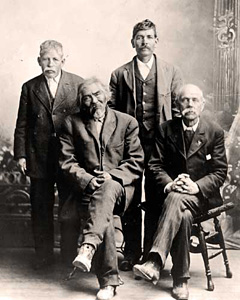
|
 |
 |
 News from Around the Americas | January 2008 News from Around the Americas | January 2008  
Federal Study Backs Up Land Claim by Tigua Tribe
 Associated Press Associated Press
go to original


| | (Left to Right) Three Tigua Scouts: Sostenos Gonzáles, Manuel Ortega and Francisco Gonzáles with Eugen Van Patten (principal founder of Tortugas Indian Pueblo, Las Cruces, NM. (Courtesy of Rio Grande Collection, New Mexico State University) | | |
Austin, Texas — A new federal study supports long-held claims by an American Indian tribe that the state of Texas stole 36 square miles of tribal territory in El Paso.

The 172-page report, completed last year, was obtained by the San Antonio Express-News under a Freedom of Information Act request.

Now, members of the Ysleta Pueblo del Sur, known as the Tiguas, are trying to determine what to do with the information in the study.

The territory, which the tribe lost in 1871 when the Texas Legislature used it to incorporate the town of Ysleta, is now home to tens of thousands of homes and businesses.

"The real huge problem here is what do you do about it?" Tom Diamond, the attorney for the 1,600-member tribe, told the newspaper.

The tribe says it does not plan to evict anyone, or to use the report as leverage to resolve their conflict with the state of Texas over the reopening of the tribe's Speaking Rock Casino.

The Tiguas maintain that Texas Legislature's seizure of the tribe's land violates the Indian Nonintercourse Act passed by Congress many years earlier. The Act invalidated any sale of Indian land by individuals or states not sanctioned "at some public treaty, held under the authority of the United States."

The tribe can't sue the state of Texas because the state won't waive its right to sovereign immunity. But the federal government can, so the Tiguas will rely on it to pursue a lawsuit, Diamond said.

The tribe requested the report to back up its land claims, said Diamond.

The report, conducted by two historians hired by the U.S. Department of Interior, chronicles the Tiguas' history with colonial Spain, Mexico, New Mexico and, finally, the state of Texas.

Historians Charles R. Cutter and Hana Samek Norton, both experts on Spanish colonial relations with American Indian peoples, documented the tribe's journey to the El Paso area in the early 1680s after the Pueblo revolt in New Mexico, and noted that the Tiguas' land grant of about 23,000 acres came from the king of Spain in 1751.

"Spanish and Mexican authorities acknowledged the possession of the grant by the Pueblo of Ysleta del Sur in documents dated 1751, 1825, 1839 and 1841," but Texas stripped the tribe of virtually all of that land, the report said.

The U.S. government signed an agreement with the tribe in January 2007, several months before the report was finished, stipulating its responsibility to help the Tiguas develop the tribe's potential land and water rights claims "and to take actions consistent with those rights."

Officials in the Bureau of Indian Affairs, a part of the Interior Department, declined to discuss the report last week when contacted by the Express-News.

The tribe's leaders and its lawyer would not comment on the report's specific findings because of a confidentiality agreement with the Department of Interior.

The Texas attorney general's office would not comment on a report it had not seen, said Tom Kelley, spokesman for Attorney General Greg Abbott.

A spokeswoman for Gov. Rick Perry, Allison Castle, said, "Threatening a lawsuit 137 years late is questionable at best. No disrespect is intended, but Texas faces serious challenges on a number of issues and real problems that need to be addressed. This isn't one of them." | 
 | |
 |



